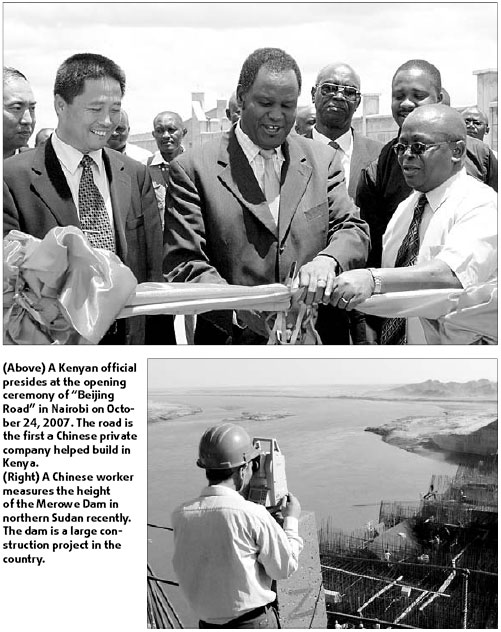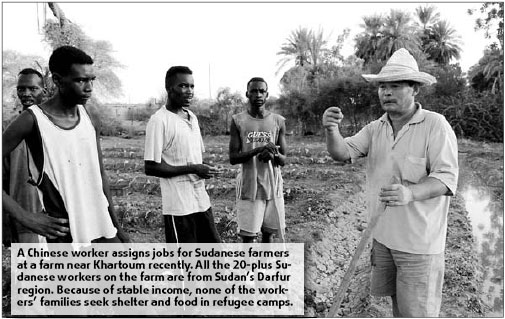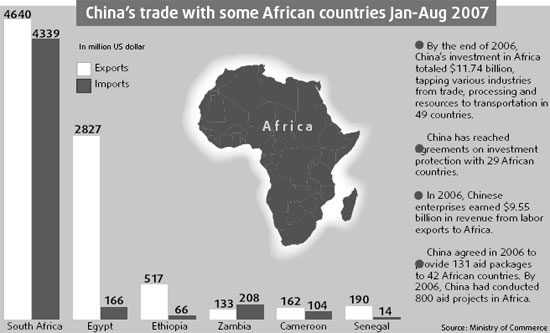A bond gaining steam by the day
Updated: 2007-11-05 07:04

Rangisheley, a South African single mother of three children, used to lead a hard life, earning less than 400 rents ($61.5) a month as platelayer. Her life changed after she started growing mushrooms on a just a 10 square meter area. Her earnings jumped five-fold to 2,000 rents ($308) a month. And now she can afford to send her children to school.
Chinese mushrooms have brought her something she had never expected, she told Beijing-based Global Times' reporters.
She has joined a project led by Fujian Agriculture and Forestry University professor Lin Zhanxi. The project helps single mothers near Durban in Kwazulu-Natal Province of South Africa. Chinese experts began setting up mushroom-growing bases in South Africa in 2005, says Lin, and a farmer can harvest up to 120 kg of mushrooms per square meter a year. Which means, he or she can earn about 24,000 rents ($3,692) a year by growing mushrooms on a 10-square-meter plot. And that's more than most local farmers' average income.
Many single mothers such as Rangisheley thank the Chinese experts for changing their lives. Lin is one of the many "good men in Africa". More Chinese nationals like Lin are working for the benefit of Africans, especially after the Forum on China-Africa Cooperation (FOCAC) Summit in Beijing last November.
At the summit, China pledged to build 10 agriculture technology demonstration centers in Africa in three years. And before the end of this year, China will have dispatched 51 senior experts to help 17 African countries in agriculture sectors, according to the Chinese Foreign Ministry.
Uganda's Minister of Agriculture, Animal Industry and Fisheries Hilary Onek says his country needs to change agriculture's traditional role from being just livelihood into business. And Uganda expects to cooperate with China in the technical field to achieve that.
"Uganda is looking forward to sharing China's experience and technology. We encourage more and more involvement of Chinese scientists and economists to help us take off," Onek says. The agriculture technology demonstration center that China promised to set up is a very good thing, he says, because farmers can learn new techniques there. "Cooperating with China, Uganda can develop good varieties of rice. If the experiment proves successful, the scientists can get good seeds, and the 12 seed companies in Uganda can buy and sell them to farmers. For us, the crop quality improves," Onek says.

Malaria is a major killer in Africa. The disease infects about 320 million Africans south of the Sahara and costs the continent $12 billion. To help Africans fight the disease, President Hu Jintao promised at last year's China-Africa Summit to help set up 30 malaria treatment and prevention centers in the continent.
The first China-aided malaria prevention and treatment center was opened in Liberia in early February. Nine more are to open across the continent before the end of the year. About 1,000 Chinese doctors and nurses are already working in Africa.
Wang Yusheng, a Beijing-based researcher in international relations, says the FOCAC is a milestone in China-Africa ties.
China's ambassador to Mauritius Gao Yucheng has told a local media the FOCAC turned a new page in China-African relations. Since then three top Chinese leaders have visited 20 African countries, and presidents of three African countries, a prime minister and more than 90 ministers have visited China.

On the aid front, China has offered more help to 45 African countries. Twenty-six least developed African countries have been granted free-tariff access, covering 454 items, to the Chinese market since July this year. And by the end of the year, China will have exempt to the debt of 33 poor African countries that have established diplomatic relationships with it.
Sino-African trade hit $55 billion last year, and is projected to reach $100 billion by 2010. In the first half of this year alone, China has invested $485 million directly in Africa.
|
|
|
||
|
||
|
|
|
|

